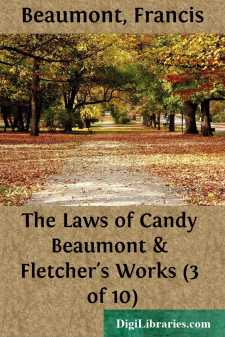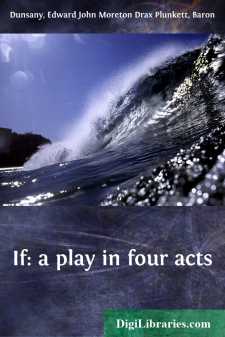Drama Books
Sort by:
ACT I SCENE: The library of ASHER PINDAR'S house in Foxon Falls, a New Englandvillage of some three thousand souls, over the destinies of whichthe Pindars for three generations have presided. It is a large,dignified room, built early in the nineteenth century, with whitedoors and gloss woodwork. At the rear of the stage,—which is thefront of the house,—are three high windows with small, square...
more...
Two of the dramas contained in this volume are the most celebrated of all Calderon's writings. The first, "La Vida es Sueno", has been translated into many languages and performed with success on almost every stage in Europe but that of England. So late as the winter of 1866-7, in a Russian version, it drew crowded houses to the great theatre of Moscow; while a few years earlier, as if to...
more...
by:
John Galsworthy
SCENE I It is just after sunset of an August evening. The scene is aroom in a mountain hut, furnished only with a table, benches.and a low broad window seat. Through this window three rockypeaks are seen by the light of a moon which is slowly whiteningthe last hues of sunset. An oil lamp is burning. SEELCHEN, amountain girl, eighteen years old, is humming a folk-song, andputting away in a cupboard...
more...
by:
Bernard Shaw
ACT I A fine October morning in the north east suburbs of London, a vast district many miles away from the London of Mayfair and St. James's, much less known there than the Paris of the Rue de Rivoli and the Champs Elysees, and much less narrow, squalid, fetid and airless in its slums; strong in comfortable, prosperous middle class life; wide-streeted, myriad-populated; well-served with ugly iron...
more...
by:
Francis Beaumont
Actus PrimusScena Prima Enter Gaspero, and Melitus MelitusSir, you're the very friend I wish'd to meet with,I have a large discourse invites your earTo be an Auditor. GasperoAnd what concerns it? MelitusThe sadly thriving progress of the lovesBetween my Lord, the Prince, and that great Lady,Whose insolence, and never-yet-match'd Pride,Can by no Character be well exprest,But in her only...
more...
by:
Oscar Wilde
FIRST ACT SCENE The octagon room at Sir Robert Chiltern’s house in Grosvenor Square. [The room is brilliantly lighted and full of guests. At the top of the staircase stands lady chiltern, a woman of grave Greek beauty, about twenty-seven years of age. She receives the guests as they come up. Over the well of the staircase hangs a great chandelier with wax lights, which illumine a large...
more...
ACT I SCENE 1 A small railway station near London. Time: Ten years ago. BERT'Ow goes it, Bill? BILLGoes it? 'Ow d'yer think it goes? BERTI don't know, Bill. 'Ow is it? BILLBloody. BERTWhy? What's wrong? BILLWrong? Nothing ain't wrong. BERTWhat's up then? BILLNothing ain't right. BERTWhy, wot's the worry? BILLWot's the worry? They don't give...
more...
MERRY WIVES OF WINDSOR. Besides the copies of the Merry Wives of Windsor appearing in the folios and modern editions, a quarto, Q, has been collated in these Notes, of which the following is the title: The | Merry Wives | of Windsor. | with the humours of Sir John Falstaffe, | as also, The swaggering Vaine of Ancient | Pistoll, and Corporall Nym. |written by William Shake-speare. | Newly corrected. |...
more...
by:
William Congreve
TO THERIGHT HONOURABLE CHARLES MONTAGUE,ONE OF THE LORDS OF THE TREASURY. Sir,—I heartily wish this play were as perfect as I intended it, that it might be more worthy your acceptance, and that my dedication of it to you might be more becoming that honour and esteem which I, with everybody who is so fortunate as to know you, have for you. It had your countenance when yet unknown; and now it is made...
more...
SCENE I. The Royal Gardens in Aranjuez. CARLOS and DOMINGO. DOMINGO.Our pleasant sojourn in AranjuezIs over now, and yet your highness quitsThese joyous scenes no happier than before.Our visit hath been fruitless. Oh, my prince,Break this mysterious and gloomy silence!Open your heart to your own father's heart!A monarch never can too dearly buyThe peace of his own son—his only son.[CARLOS looks...
more...











